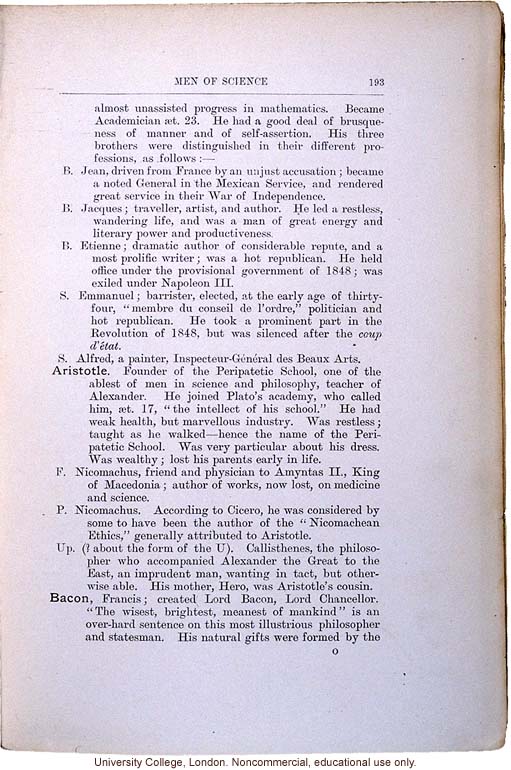Hereditary Genius: An Enquiry into Its Laws and Consequences (2nd ed.), by Francis Galton, selected pages (13)

Hereditary Genius: An Enquiry into Its Laws and Consequences (2nd ed.), by Francis Galton, selected pages (13)
2030. Men of Science 193 almost unassisted progress in mathematics. Became Academician aet. 23. He had a good deal of brusqueness of manner and of self-assertion. His three brothers were distinguished in their different professions, as follows:-- B. Jean, driven from France by an unjust accusation; became a noted General in the Mexican Service, and rendered great service in their War of Independence. B. Jacques; traveller, artist, and author. He led a restless, wandering life, and was a man of great energy and literary power and productiveness. B. Etienne; dramatic author of considerable repute, and a most prolific writer; was a hot republican. He held office under the provisional government of 1848; was exiled under Napoleon III. S. Emmanuel; barrister, elected, at the early age of thirty-four, "member du conseil de l'ordre," politician and hot republican. He took a prominent part in the Revolution of 1848, but was silenced after the [italic]coup d'[acute accent of 'e']tat[end italics]. S. Alfred; a painter, Inspecteur-G[acute accent of 'e']n[acute accent over 'e']ral des Beaux Arts. Aristotle. Founder of the Peripatetic School, one of the ablest of men in science and philosophy, teacher of Alexander. He joined Plato's academy, who called him, aet. 17, "the intellect of his school." He had weak health, but marvellous industry. Was restless; taught as he walked-hence the name of the Peripatetic School. Was very particular about his dress. Was wealthy; lost his parents early in life. F. Nichomachus, friend and physician to Amyntas II., King of Macedonia; author of works, now lost, on medicine and science. P. Nicomachus. According to Cicero, he was considered by some to have been the author of the "Nicomachean Ethics," generally attributed to Aristotle. Up. ([italics]?[end italics] about the form of the U). Callisthenes, the philosopher who accompanied Alexander the Great to the East, an imprudent man, wanting in tact, but otherwise able. His mother, Hero, was Aristotle's cousin. Bacon, Francis; created Lord Bacon, Lord Chancellor. "The wisest, brightest, meanest of mankind" is an over-hard sentence on this most illustrious philosopher and statesman. His natural gifts were formed by the [end]
- ID: 11940
- Source: DNALC.EA


